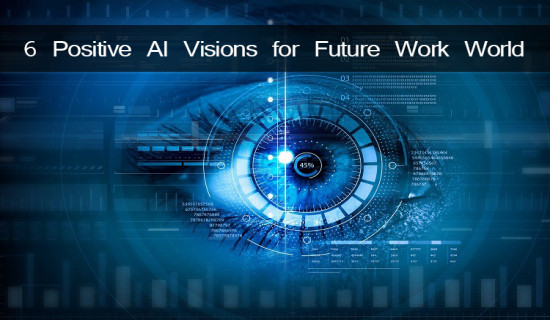- Many AI experts predict that machines may outperform humans at every task within 45 years.
- There is currently no consensus on how to shape these technologies to support a changing workforce and economy.
- We asked over 150 experts to discuss these challenges and share their positive AI futures.
Current AI trends are nothing short of remarkable. Every day, we hear about systems and machines performing tasks that, until recently, we thought were solely and permanently reserved for humans: making medical diagnoses, drafting legal documents, designing buildings, and even composing music.
Our concern here is with something even more startling: the prospect of high-level machine intelligence systems outperforming humans in almost every task. This is not a work of science fiction. According to a recent survey, the median estimate among leading computer scientists was that this technology would be available within 45 years.
Importantly, the survey revealed significant disagreement. Some believe that high-level machine intelligence will arrive much sooner, while others believe it will arrive much later, if at all. Such divergences of opinion abound in recent AI literature, ranging from popular commentary to more expert analysis.
Regardless of these opposing viewpoints, one thing is certain: if we believe this type of outcome is possible, it should demand our attention. Continued advancement in these technologies could have extremely disruptive consequences, exacerbating recent trends in inequality, undermining work as a force for social integration, and undermining a source of purpose and fulfillment for many people.
Six AI scenarios that could build a positive future
One of the most major obstacles to action is that there is currently no agreement on what future we should aim for, possibly because there is little discussion about what might be desirable. This lack of vision is a problem because, if high-level machine intelligence does arrive, we risk being overwhelmed by unprecedented technological change and unstoppable economic forces. This would be a huge missed opportunity.
As a result, workshop attendees and interviewees, ranging from science-fiction writers to economists and AI experts, attempted to articulate positive visions of a future in which Artificial Intelligence can do the majority of what we currently call work.
These scenarios represent possible human trajectories. However, none of them are unambiguously achievable or desirable. While there are elements of significant agreement and consensus among the visions, there are also revealing clashes.
1. Shared economic prosperity
The economic benefits of technological progress are widely shared around the world. The global economy is 10 times larger because AI has massively boosted productivity. Humans can do more and achieve more by sharing this prosperity. This vision could be pursued by adopting various interventions, from introducing a global tax regime to improving insurance against unemployment.
2. Realigned companies
Large companies focus on developing AI that benefits humanity, and they do so without holding excessive economic or political power. This could be pursued by changing corporate ownership structures and updating antitrust policies.
3. Flexible labour markets
Human creativity and hands-on support give people time to find new roles. People adapt to technological change and find work in newly created professions. Policies would focus on improving educational and retraining opportunities, as well as strengthening social safety nets for those who would otherwise be worse off due to automation.
4. Human-centric AI
Society decides against excessive automation. Business leaders, computer scientists, and policymakers choose to develop technologies that increase rather than decrease the demand for workers. Incentives to develop human-centric AI would be strengthened and automation taxed where necessary.
5. Fulfilling jobs
New jobs are more fulfilling than those that came before. Machines handle unsafe and boring tasks, while humans move into more productive, fulfilling, and flexible jobs with greater human interaction. Policies to achieve this include strengthening labour unions and increasing worker involvement on corporate boards.
6. Civic empowerment and human flourishing
In a world with less need to work and basic needs met by UBI, well-being increasingly comes from meaningful unpaid activities. People can engage in exploration, self-improvement, volunteering or whatever else they find satisfying. Greater social engagement would be supported.

